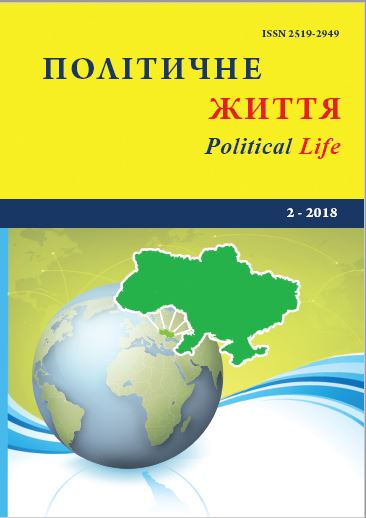Government and Parliamental Opposition in the Czech Republic (Political and Legal Aspects of Interaction).
DOI:
https://doi.org/10.31558/2519-2949.2018.2.3Keywords:
parliamentary opposition, parliamentary majority, Czech Republic, parliament, vote of no confidenceAbstract
The political and legal aspects of interaction of the parliamentary opposition and the government in the Czech Republic after 1993 were investigated. The role, powers and resources of the parliamentary opposition in the country while carrying out of government control functions are explained.
It is clarified that on the one hand, the relations between the government and the parliamentary opposition in the country are determined by the institutional design, which determines the political and legal field of activity of political persons, determines the channels of their interaction and establishes certain restrictions. On the other hand, they depend on the ratio of political forces in the parliament, the level of stability of government support, the effectiveness of its policies and can balance from confrontation to cooperation.
It is noted that the parliamentary opposition in the Czech Republic, in the absence of a separate legal regulation of its activities, remains an important political institution in the mechanism of containments and counterbalances. The extent of the rights it is granted in the House of Representatives is rather high, despite the fact that the capacity of legislative influence on the government remains insignificant.
This is due to the fact that the majority principle is constitutionally vested in the formation of the government. In the most complete way the control functions of the parliamentary opposition are carried out through a vote of no confidence in the government. This procedure, despite its poor performance, still has a notable political effect and is an attempt to combine parliamentary activity with the extra-parliamentary and aims at obtaining political dividends in the form of mobilizing the protest electorate. Under the conditions of absence of stable support of the government from the side of the parliamentary majority, the chances of influence on the government grow among the opposition.
References
Balik S. The Political System in the Czech Republic / S. Balik, V. Hloušek , J. Holzer / Political Systems of Visegrad Group Countries / Ed. W. Gizicki. – Trnava-Lublin: University of Ss Cyril and Methodius in Trnava, 2012. – P. 13–41.
Hloušek V. Political parties and party system in the Czech Republic after 1989. [Електронний ресурс] / V. Hloušek, J. Šedo. – Режим доступу: http://ispo.fss.muni.cz/uploadsg/2download/Working_papers /ispo_wp_ 2007_ 10.pdf.
Mansfeldova Z. Parliamentary Opposition in the Czech Republic. [Електронний ресурс] / Z. Mansfeldova, P. Guasti. – Режим доступу: https://ecpr.eu/Filestore/PaperProposal/69c98acc-1ff0-4016-8e7d-89d6dc284028.pdf.
Linek L. The Parliament of the Czech Republic, 1993–2004 / L. Linek, Z. Manseldová // Journal of Legislative Studies. 2007. – Vol. 13. – No. 1. P. 12–37.
Syllová J. Parlament České republiky / J. Syllová, J. Georgiev, P. Kolář, Š. Pecháček. – Praha: Linde, 2008. – 478 s.
Laver M. Government Accountability in Parliamentary Democracy / M. Laver, A. Kenneth / Democracy, Accountability and Representation. –Cambridge NY: Cambridge University Press, 1999. P. 279–296.
Зеленько Г. Політична «матриця» громадянського суспільства (досвід країн Вишеградської групи та України) / Г. Зеленько. – К.: Знання України, 2007. – 336 с.
Сорока С. Механізми взаємодії уряду і парламенту в процесі державного управління: досвід країн Європейського Союзу та українська практика / С. Сорока. – М.: Видавництво ЧДУ імені Петра Могили, 2012. – 421 с.
Constitution of the Czech Republic of 16 December 1992. [Електронний ресурс]. – Режим доступу: https://www.usoud.cz/ fileadmin/user_upload/Tiskova_mluvci/Ustava_EN _ve_zneni_zak_c._98-2013.pdf.
Коврякова Е. Парламентский контроль: зарубежный опыт и российская практика / Е. Коврякова. – М.: ОАО «Издательский дом «Городец», 2005. – 191 с.
Ільницька У. Парламентська опозиція як інституційний аспект контрольної функції парламенту / У. Ільницька // Українська національна ідея: реалії та перспективи розвитку. – 2011. – Вип. 23. – С. 76–84.
Бойко О. Аналіз інформаційно-комунікативних технологій як механізму досягнення політичного результату / О. Бойко // Науковий вісник Ужгородського університету. – 2009. – Серія: Політологія, Соціологія, Філософія. – Вип. 11. – С. 29–34.

